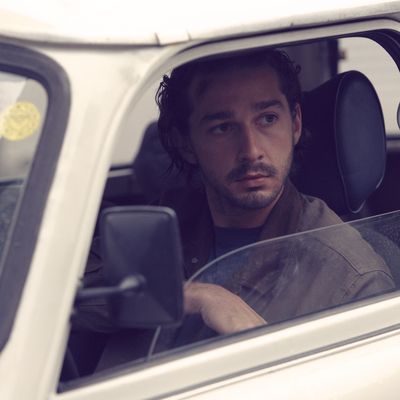
Charlie Countryman starts off with a couple of the most startling scenes of any film I’ve seen this year. I’m not even talking about the elegantly stylized, slo-mo shots of Shia LaBeouf covered in blood, getting shot, and plummeting to his death that open the film. (Go ahead, say it: “No movie that starts with Shia LaBeouf dying in horrible fashion can be all that bad.”) Rather, it’s what comes after: Charlie (LaBeouf) being roused out of a morbid reverie to go see his comatose mother (Melissa Leo) breathe her last in a drab hospital room. It’s a profoundly grim moment, too painful to watch. But when she dies, he spies a small, ghostly sliver of light escape out of her. Is this her soul? Charlie is too distraught to care. So much death, so early on. Where does this movie go from here?
Well, Bucharest, apparently. After her passing, Charlie’s mom comes to him in a vision. He asks her what he should do with his life, where he should go. She says she’s never been good at life advice. But he presses her, so she blurts it out: “Bucharest. I dunno, it seems specific.” So, off he goes. On the plane, he meets a chatty, unremarkable man bringing a funny furry hat for his daughter. When the guy suddenly dies, mid-flight, Charlie feels some obligation to connect with the daughter — especially after he sees that she isn’t some small child but rather statuesque, gorgeous cellist Gabi (Evan Rachel Wood). Anyway, Charlie’s in love, she has a psycho assassin husband named Nigel (Mads Mikkelsen), and it all goes downhill from there.
LaBeouf isn’t bad here. He has the right wide-eyed, slightly daffy inquisitiveness to propel this dim character on his unlikely forays. He’s not a square, à la Jeff Daniels in Something Wild, but rather a guy who just seems anxious, excited, and lost. When he suddenly takes the wheel of the distraught Gabi’s car and catches up to the madly speeding ambulance carrying her father’s corpse, we buy it. When he joins his hostel-mates Karl (Rupert Grint) and Luc (James Buckley) on Carpathian ecstasy–fueled drug benders, he looks the part.
Meanwhile, Mikkelsen takes a nothing role and gives it energy. His menacing interactions with Charlie carry an odd undercurrent of tenderness, of thwarted fraternity: If he weren’t a complete psycho bent on killing the boy, they might have been secret-sharers. This isn’t an original idea, but give Mikkelsen props for bringing some pep. It’s important not just for the energy of the movie, but also because the character’s backstory, once revealed, will ask us for a modicum of sympathy for this obsessive, murderous fiend. Wood isn’t quite as compelling as her two suitors — her Romanian accent feels too much like shtick — but she has presence, as always.
There is an idea here: Something to do with death, obviously, and the way we approach it. “I didn’t mean for you to be running out on death scenes,” Charlie’s dead mom tells him at one point. But it gets buried amid the usual Westerner-abroad clichés, amid the Oh-no-my-girlfriend’s-ex-is-a-psycho clichés. And director Fredrik Bond seems more interested in his lush tableaux of decadence and violence and music-video montages than in really exploring the idea of what it means to face death, or even what it means to find love where you least expect it. It’s possible he’s clutching at straws here: The film originally premiered at Sundance with the title The Necessary Death of Charlie Countryman, and it appears to have been reedited from that earlier version. (Reportedly, John Hurt once narrated.) Maybe it wasn’t always this fragmented and thin. But however you cut it, with all that talent, Charlie Countryman feels like a sad, wasted opportunity.


